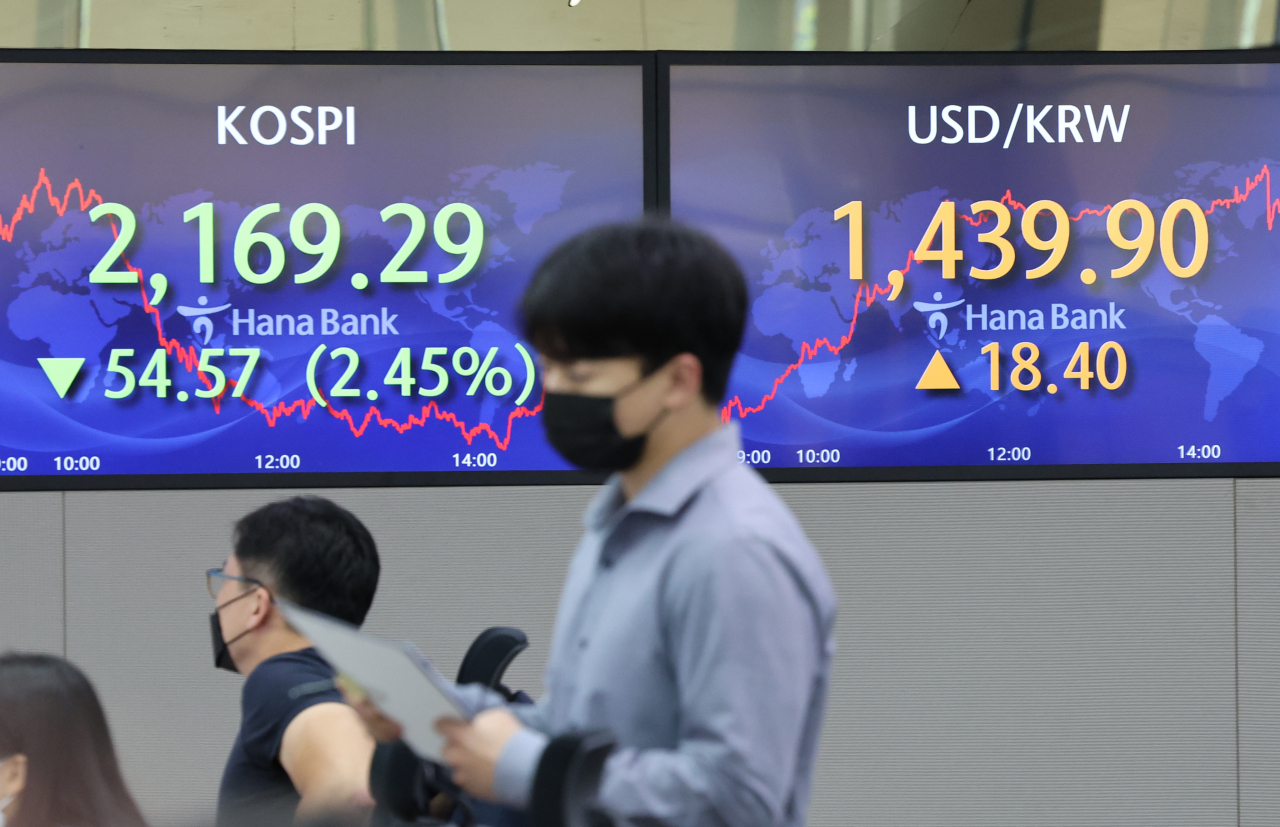Seoul stocks sink to over 2-year low on recession woes; Korean won at over 13-yr trough
By YonhapPublished : Sept. 28, 2022 - 16:04

Seoul stocks dropped to the lowest level in more than two years and the Korean won tumbled to a 13-year low Wednesday on deepening concerns over a global recession in the wake of aggressive monetary tightening in major economies.
The benchmark Korea Composite Stock Price Index (KOSPI) fell by 54.57 points, or 2.45 percent, to end at 2,169.29, the lowest since July 20, 2020, when the market closed at 2,198.20.
The KOSPI dived more than 3 percent on Monday before inching up 0.13 percent the following session.
Trading volume was moderate at 586.26 million shares worth 9.06 trillion won ($6.28 billion), with decliners far outnumbering gainers 823 to 91.
Institutions and foreigners sold a net 178.24 billion won and 149.74 billion won worth of shares, respectively, effectively offsetting buying by individual investors worth 325.1 billion won.
The stock market opened lower, tracking an overnight fall on Wall Street, and extended losses further, as investor sentiment was dampened by fears that the global economy would fall into a recession over aggressive rate hikes by the Federal Reserve and other nations following suit.
Last week, the Fed raised its benchmark federal funds rate by 0.75 percentage point for a third consecutive time, and Chair Jerome Powell vowed not to flinch from fighting inflation.
Federal Reserve officials have also stressed the need to keep raising rates, with St. Louis Fed chief James Bullard warning Tuesday of "more increases" to "appropriately" respond to high prices.
"We cannot rule out the possibility of inflation surging further in line with how geopolitical issues unfold down the road, such as the war in Ukraine," former Bank of Korea chief Lee Ju-yeol told an investment conference in the day.
Analysts also pointed to multiple unfavorable external factors as reasons for Wednesday's market rout.
According to foreign media reports, Apple would drop a plan to boost production of its new smartphones after the expected growth in demand failed to materialize.
News about the large amount of gas leakage from the Nord Stream pipelines in an apparent sabotage also deepened concerns over energy and the overall economic circumstances in Europe.
In Seoul, most large-cap shares lost ground.
Market bellwether Samsung Electronics lost 2.4 percent to close at a fresh 52-week low of 52,900 won, and SK hynix, the world's second-largest memory chip maker, shed 0.98 percent to 81,200 won.
Battery maker LG Energy Solutions sank 2.36 percent to 433,500 won, and Samsung SDI tumbled 3.92 percent to 564,000 won.
Major chemical firm LG Chem dived 4.04 percent to 546,000 won, and top steelmaker POSCO went down 0.44 percent to 228,000 won.
Top automaker Hyundai Motor dipped 3.49 percent to 179,500 won, and its affiliate Kia decreased 3.4 percent to 73,900 won.
Internet giant Naver lost 1.96 percent to 200,500 won, and Kakao, the operator of the popular mobile messenger Kakao Talk, also retreated 4.05 percent to 56,900 won.
But bio shares finished higher, with Samsung Biologics jumping 1.72 percent to 767,000 won and Celltrion rising 0.6 percent to 166,500 won.
The local currency ended at 1,439.90 won against the US dollar, sharply down 18.40 won from the previous session's close. It marked the lowest level since March 16, 2009, when the currency ended at 1,444.0 won. (Yonhap)



















![[Today’s K-pop] Treasure to publish magazine for debut anniversary](http://res.heraldm.com/phpwas/restmb_idxmake.php?idx=642&simg=/content/image/2024/07/26/20240726050551_0.jpg&u=)